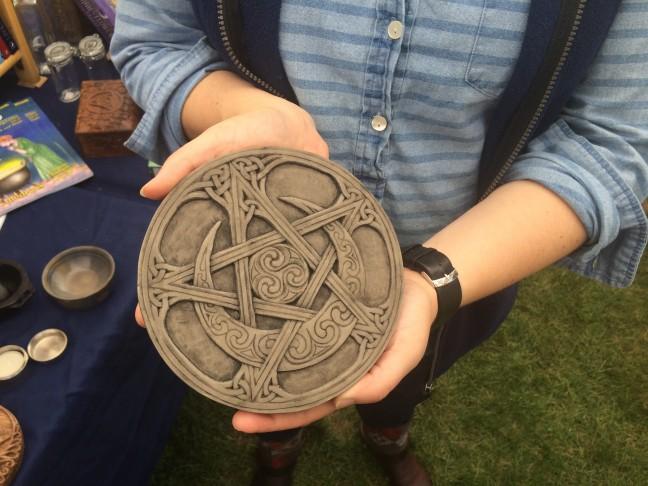If you’re at all like me, the term “Paganism” might be unclear to you. When I hear it, I think of feral rituals conducted around raging bonfires, more often than not involving impish goat-legged satyrs romping around playing flutes.
Although appealing, I recognize that this is likely an inaccurate description highly indicative of my overwhelming ignorance regarding Paganism. Thankfully, I had the opportunity to educate myself further in this rather esoteric faith Saturday afternoon, when I attended Madison’s 18th annual Pagan Pride Day.
I biked nearly seven miles to Winnequah Park on the east side of Lake Monona, affirming my arrival at the correct destination when a pungent wall of incense assaulted my nostrils upon approach. The festival took the form of about 20 individual vendors’ tents assembled on a soccer field, with three special lecture tents set some distance apart.

Aaron Hathaway/The Badger Herald
As I approached the festival, two friendly local Pagans handed me a leaflet documenting the day’s events. I’m no expert, but I sure do know a quality Pagan festival when I see one. Highlights of the itinerary included a workshop called “Sacred Sound: Advanced Chanting Techniques for Rituals,” “Continuing the Circle: Raising Children Within a Neo-Pagan Lifestyle” and “Working With Spirit Guides,” among other similarly tempting seminars.
The attendees appeared to be sourced exclusively from the bulk quinoa sections of various organic co-ops around Madison. It was the sort of crowd that wore tie-dye on a daily basis. I felt rather out of place without a peacock feather in my hair.

Aaron Hathaway/The Badger Herald
The main attraction of the gathering was the large array of Pagan vendors on site. This bustling hub of commerce was an ideal one-stop shop for artistic pentagram necklaces, wooden replicas of Mjolnir (Thor’s mighty hammer) and incense that smells like your liberal aunt’s Prius.
In one tent, a Pagan wearing an Apple Watch explained to me the symbolic relevance of the pentagram in traditional rituals. Nearby, a young man wearing a man bun and a kilt practiced fighting techniques with a wooden staff.

Aaron Hathaway/The Badger Herald
This contrast is a good representation of the somewhat confusing mix of themes present at the festival. Pagan Federation International defines Paganism as “a polytheistic or pantheistic nature-worshipping religion.”
However, this isn’t exactly the impression I got from attending the festival. If I were asked to define Paganism based simply on my experiences at this event, I would guess it’s a mixture of viking roleplay, animism and ethnically ambiguous arts and crafts.

Aaron Hathaway/The Badger Herald
Overall, I found the 18th annual Madison Area Pagan Pride Day to be a very educational experience. I learned that there is a huge profit to be made in selling exotic print-patterned maxi dresses to moms who wear dreadlocks. I learned that it is both inspiring and intimidating to make eye contact with a man wearing deer antlers and chainmail as he eats a bratwurst.
But most importantly, I think I learned the true meaning of Paganism.


